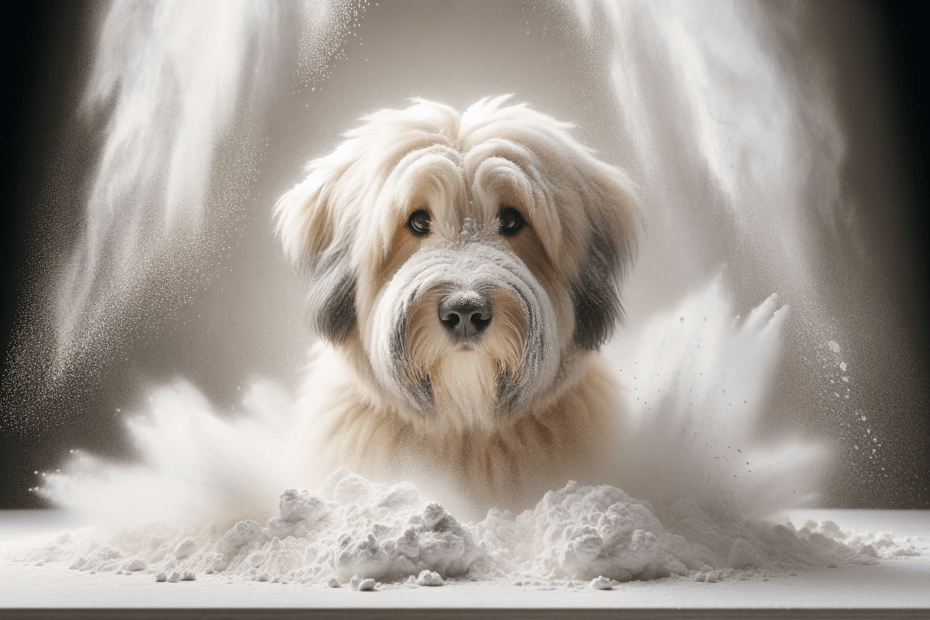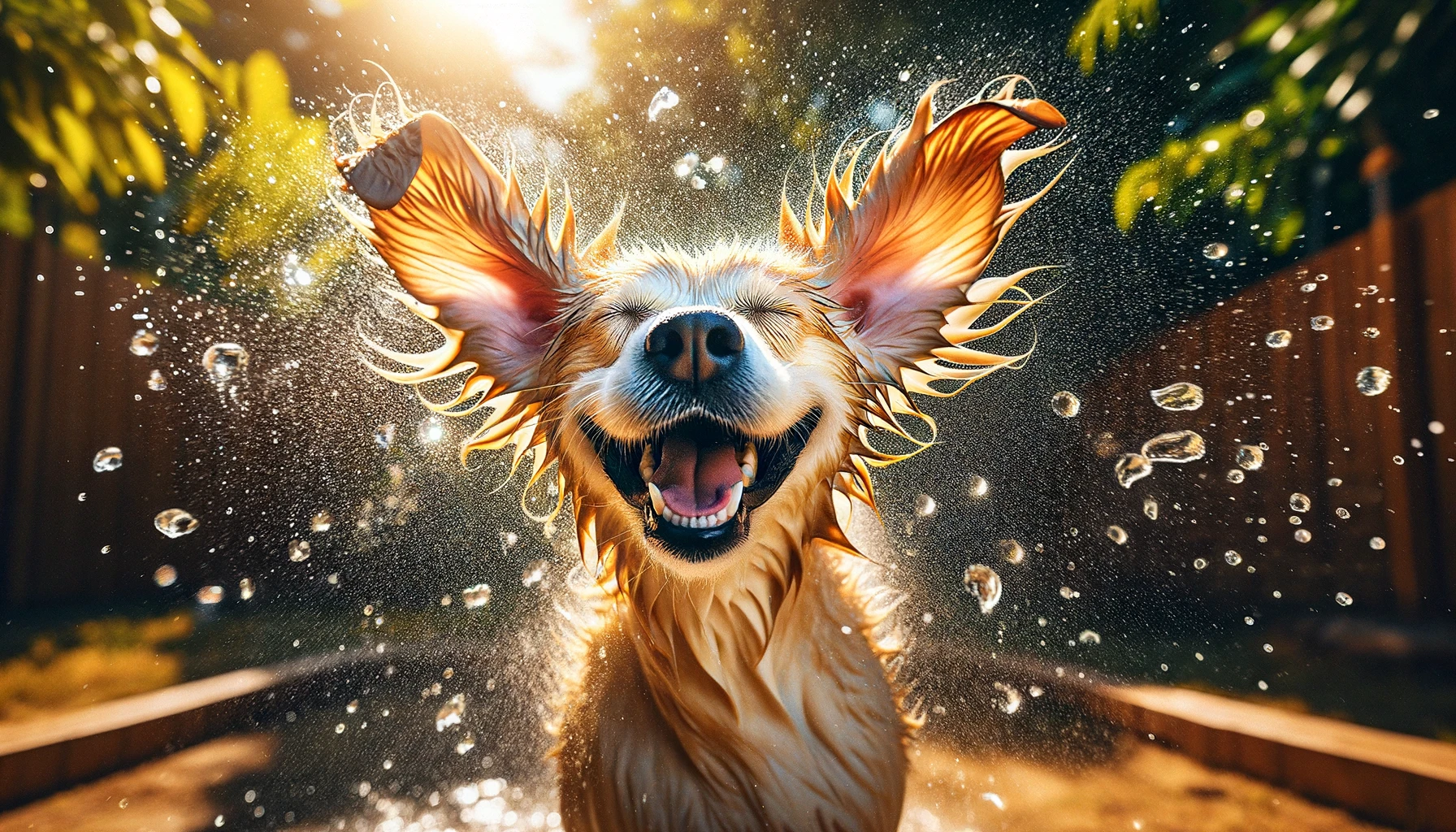In the realm of canine grooming, pet owners often seek safe and effective methods to maintain their dog’s hygiene and comfort. One common question that arises is whether baby powder can be used on dogs.
This article aims to provide an informative analysis on the topic, exploring the potential benefits and risks associated with using baby powder on dogs. By adhering to a scientific and precise approach, pet owners can make informed decisions when it comes to grooming their beloved furry companions.
Key Takeaways
- Baby powder can pose potential health risks and adverse reactions for dogs due to their different skin pH levels and sensitivities.
- Inhaling or ingesting baby powder can lead to respiratory issues or gastrointestinal problems in dogs.
- Baby powder may contain additives and fragrances that can cause allergic reactions or skin irritations in dogs.
- It is important to consult with a veterinarian before using baby powder on dogs and consider safe alternatives such as dog-specific powders, cornstarch, or baking soda.
Is Baby Powder Safe for Dogs
Baby powder should not be used on dogs as it may pose potential health risks. While baby powder may be commonly used on human infants to keep their skin dry and prevent diaper rash, it is not intended for use on animals. Dogs have different skin pH levels and sensitivities compared to humans, making them more susceptible to adverse reactions from certain products.
One of the main concerns with using baby powder on dogs is the potential for inhalation. Baby powders often contain talc or cornstarch, which can become airborne when applied and easily inhaled by dogs. Inhalation of these powders can irritate their respiratory system and lead to coughing, wheezing, or difficulty breathing. Furthermore, if a dog ingests baby powder while grooming themselves, it can cause gastrointestinal issues such as vomiting or diarrhea.
Another risk associated with using baby powder on dogs is skin irritation. The fragrances and additives found in baby powders can cause allergic reactions or skin irritations in dogs. They may experience redness, itching, or even develop rashes or sores. Additionally, dogs may be tempted to lick the powder off their fur, leading to ingestion of potentially harmful ingredients.
Potential Benefits of Using Baby Powder on Dogs
Using baby powder on dogs can have potential benefits, such as being safe for puppies, reducing odor and moisture, and potentially preventing skin irritations.
Baby powder can help keep puppies dry and clean, especially in areas prone to moisture buildup. Additionally, it can help reduce unpleasant odors and may provide a protective barrier against skin irritations.
Safe for Puppies
When used in moderation and under the guidance of a veterinarian, baby powder can be safe for puppies, offering potential benefits for their skin and coat. However, it is important to note that not all baby powders are safe for dogs, as some may contain ingredients that could be harmful if ingested or inhaled.
Therefore, it is crucial to choose a baby powder that is specifically formulated for use on dogs or seek alternatives that are safe for puppies. Some alternatives to baby powder for puppies include cornstarch or baking soda, which can help absorb excess moisture and reduce odors.
Additionally, regular grooming, such as brushing and bathing with mild dog shampoo, can also help maintain the health and cleanliness of a puppy’s skin and coat.
Always consult with a veterinarian before using any products on your puppy to ensure their safety and well-being.
Reducing Odor and Moisture
To effectively reduce odor and moisture on dogs, veterinarians recommend using a small amount of baby powder specifically formulated for canine use. Dog grooming is an essential aspect of pet care, and addressing odor and moisture is crucial to maintaining their overall health and well-being.
Baby powder can be a useful tool in this regard, as it helps absorb excess moisture and neutralize unpleasant odors. When applied correctly, it helps keep the dog’s skin dry, preventing the growth of bacteria or fungi that can contribute to skin irritations and infections.
Moreover, using baby powder as a natural remedy for reducing odor and moisture is a safe and gentle option for dog owners who prefer to avoid harsh chemicals.
Potential Skin Irritations
One potential benefit of using baby powder on dogs is that it can help alleviate potential skin irritations. Dogs can develop various skin irritations, including hot spots and allergic reactions. Hot spots are areas of inflamed and infected skin, often caused by excessive scratching or licking. Baby powder can help in preventing hot spots by keeping the skin dry and reducing moisture, which can contribute to the development of these irritations.
Additionally, dogs can also experience common allergies that can lead to itching and irritation of the skin. Baby powder can provide relief by soothing the skin and reducing itchiness. However, it is important to note that not all dogs will benefit from using baby powder, and consulting with a veterinarian is always recommended to determine the best course of action for addressing skin irritations in dogs.
Risks and Potential Dangers of Using Baby Powder on Dogs
The potential risks and dangers of using baby powder on dogs should be carefully considered due to their unique physiology and sensitivity. While baby powder is generally safe for human use, it may pose potential health risks when applied to dogs.
One of the main concerns is the inhalation of the powder particles. Dogs have a tendency to shake and groom themselves, which can lead to the inhalation of the powder into their respiratory system. This can cause respiratory issues such as coughing, sneezing, and even difficulty breathing.
Additionally, baby powder contains ingredients that can be harmful to dogs if ingested. Some baby powders may contain talc, which is toxic to dogs when ingested in large quantities. Ingestion of baby powder can lead to gastrointestinal upset, including vomiting and diarrhea.
Considering these potential risks, it is recommended to avoid using baby powder on dogs. Instead, there are safer alternatives available. Natural alternatives such as cornstarch or baking soda can be used to absorb moisture and reduce odors in between baths. These alternatives are generally safe for dogs and do not pose the same health risks as baby powder.
How to Safely Apply Baby Powder on Your Dog
When it comes to applying baby powder on your dog, it is important to choose a dog-friendly powder that is specifically formulated for pets. These powders are designed to be gentle on your dog’s skin and safe for them to ingest if they happen to lick it off.
Additionally, before applying the powder, it is crucial to check your dog’s skin for any signs of irritation or sensitivity, and to avoid using baby powder on dogs with pre-existing skin conditions or allergies.
Benefits of Dog-Friendly Powders
Applying dog-friendly powders, such as baby powder, can offer several benefits for your furry companion when done safely and correctly. Many dog owners are turning to dog-friendly alternatives like baby powder to help keep their pets clean and fresh.
One of the common misconceptions about baby powder is that it can dry out a dog’s skin. However, if used in moderation and on a dry dog, baby powder can actually absorb excess moisture, helping to prevent skin irritation and infections.
Additionally, dog-friendly powders can help to neutralize odors, making your dog smell pleasant between baths. It is important to choose a powder specifically formulated for dogs and to avoid powders containing harmful ingredients such as talc or fragrance.
Always consult with your veterinarian before using any new products on your dog’s skin.
Precautions for Sensitive Skin
To safely apply baby powder on your dog with sensitive skin, it is important to take certain precautions. Sensitive skin can be more prone to skin irritations, so it is crucial to ensure that the baby powder you use is safe and suitable for dogs.
First, choose a baby powder that is specifically formulated for sensitive skin or one that is specifically designed for use on dogs. Avoid powders that contain fragrances, talc, or other potential irritants.
Before applying the powder, conduct a patch test on a small area of your dog’s skin to check for any adverse reactions.
When applying the powder, use gentle and light strokes, making sure to avoid the face and sensitive areas such as the genitals or open wounds.
Regularly monitor your dog’s skin for any signs of redness, irritation, or discomfort and discontinue use if any adverse reactions occur.
Alternatives to Baby Powder for Dog Grooming
For effective dog grooming, there are several alternatives to baby powder that can be used. When looking for dog friendly alternatives to baby powder, it is important to consider natural grooming options that are safe and beneficial for your furry friend.
One alternative to baby powder is cornstarch. Cornstarch is a natural and safe option that can help absorb excess moisture and reduce odors in your dog’s coat. It is important to note that cornstarch should be used sparingly and not applied directly to the skin, as it may cause irritation.
Another option is baking soda. Baking soda is known for its odor-neutralizing properties and can help eliminate unwanted smells in your dog’s fur. It is safe to use on dogs, but it is advisable to test a small amount on a small area of your dog’s skin to ensure they do not have any adverse reactions.
Furthermore, you can consider using natural grooming sprays or wipes specifically designed for dogs. These products often contain natural ingredients like aloe vera or chamomile, which can help freshen up your dog’s coat without causing any harm.
Tips for Choosing the Right Baby Powder for Your Dog
When considering the use of baby powder on dogs, it is essential to carefully select the appropriate product for their specific needs. Choosing natural alternatives and avoiding harmful ingredients is crucial to ensure the safety and well-being of your furry friend.
When selecting a baby powder for your dog, it is important to opt for natural alternatives that are free from synthetic fragrances, dyes, and other potentially harmful chemicals. Look for products that are made with natural ingredients such as cornstarch, rice starch, or arrowroot powder. These ingredients are gentle on your dog’s skin and help absorb excess moisture without causing irritation.
Avoid baby powders that contain talcum powder, as it can be harmful to dogs if ingested or inhaled. Talcum powder has been linked to respiratory issues and even cancer in humans, so it is best to avoid it altogether for your pet.
Additionally, check the label for any added fragrances or essential oils, as some dogs may have sensitivities or allergies to these ingredients. Opt for unscented or fragrance-free baby powders to minimize the risk of skin irritation.
Consulting Your Veterinarian Before Using Baby Powder on Your Dog
Consulting a veterinarian before using baby powder on your dog is imperative to ensure their safety and well-being. While baby powder may seem harmless, it is important to understand that dogs have different skin sensitivities and requirements compared to humans. Using baby powder on dogs without consulting a vet can pose potential risks.
One of the main concerns with using baby powder on dogs is the ingredients found in these products. Some baby powders contain talcum powder, which can be harmful if ingested or inhaled by dogs. Ingesting talcum powder can lead to gastrointestinal issues, while inhalation can cause respiratory problems. Additionally, certain fragrances and additives found in baby powders can irritate a dog’s skin, leading to itching, redness, and discomfort.
Another risk of using baby powder on dogs without veterinary guidance is the potential for underlying skin conditions to worsen. Dogs may have allergies, dermatitis, or other skin issues that may be aggravated by the use of baby powder. A veterinarian can accurately diagnose and provide appropriate treatment options for these conditions, ensuring the dog’s overall well-being.
Frequently Asked Questions
Can I Use Scented Baby Powder on My Dog?
Using scented baby powder on dogs as a dry shampoo is not recommended. While baby powder can help absorb excess moisture and oil on a dog’s coat, scented powders may contain ingredients that can be harmful to dogs if ingested or inhaled.
Additionally, dogs have a more sensitive sense of smell than humans, and the strong fragrance of scented baby powder may cause discomfort or irritation.
It is best to consult with a veterinarian for safe and suitable alternatives for maintaining your dog’s coat cleanliness.
How Often Should I Apply Baby Powder on My Dog?
Applying baby powder to a dog’s paws can provide several benefits. It can help absorb moisture and reduce friction, preventing irritation and discomfort.
Additionally, baby powder can help control odors, keeping your dog’s paws smelling fresh. However, it is important to use a baby powder specifically formulated for dogs, as scented or talc-based powders can be harmful.
When applying baby powder, it is recommended to do so sparingly and on an as-needed basis, avoiding excessive use.
Can I Use Baby Powder on My Dog’s Face?
Using baby powder on dogs for odor control is a common practice among pet owners. However, when it comes to applying baby powder on a dog’s face, caution should be exercised.
The safety of using baby powder on dogs with sensitive skin, especially on the face, is a concern. The chemicals and fragrances in baby powder can cause irritation and discomfort.
It is advisable to consult a veterinarian before using any products on your dog’s face to ensure their safety and well-being.
Are There Any Specific Dog Breeds That Should Not Have Baby Powder Applied?
There are specific dog breeds that may have allergies to baby powder and should not have it applied. These breeds include Bulldogs, Boxers, and Pugs, as they are prone to skin sensitivities. It is important to consult with a veterinarian before using any grooming products on these breeds.
For dogs with sensitive skin, alternative grooming products such as hypoallergenic shampoos or natural oils can be used to keep their coat clean and healthy.
Can Baby Powder Help With Flea Control on Dogs?
Natural alternatives to baby powder for flea control on dogs should be considered before using baby powder. While baby powder may temporarily alleviate itching and absorb moisture, it is not an effective solution for flea control.
Instead, pet owners should explore options such as flea shampoos, sprays, and topical treatments specifically designed for dogs. It is important to be aware of the potential risks and side effects of using baby powder on dogs, including respiratory issues and ingestion toxicity.
Consulting with a veterinarian is advised for proper flea control methods.
Conclusion
In conclusion, while baby powder may seem like a convenient option for grooming dogs, it is not recommended due to potential risks and dangers. It can be harmful if ingested or inhaled by dogs, leading to respiratory issues or digestive problems.
There are safer alternatives available for dog grooming, such as specialized dog grooming products or natural alternatives. It is always best to consult with a veterinarian before using any products on your dog to ensure their safety and well-being.






